Beekeeping Experiences: A Day in the Hive
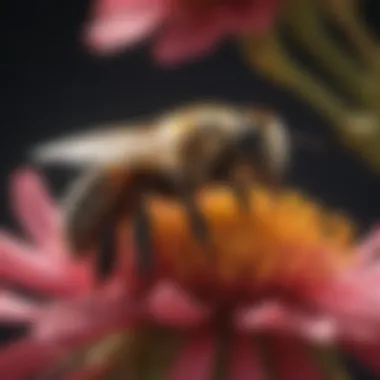
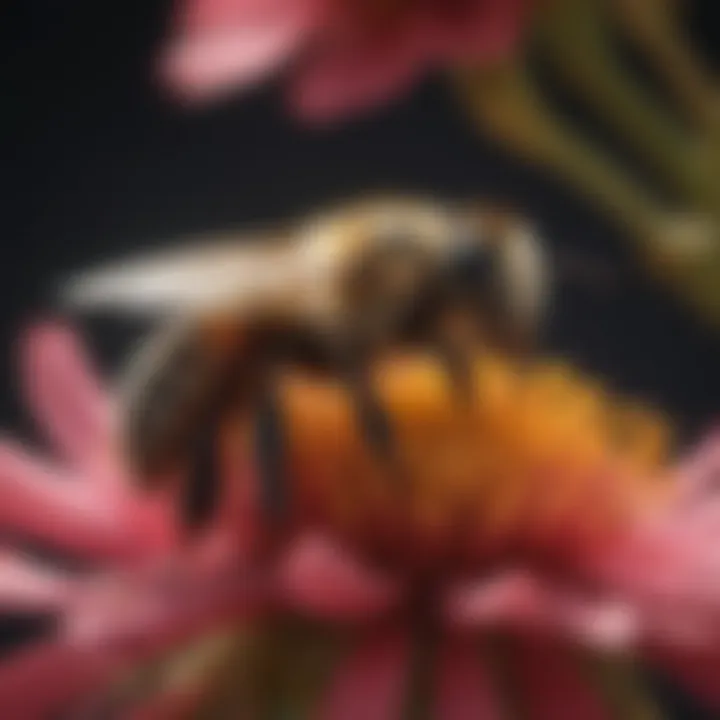
Intro
Beekeeping, often seen as an age-old practice, holds a contemporary charm with tangible effects on various agricultural facets and the wider ecological system. Immersing oneself in a day as a beekeeper reveals not just the routine of hive management but also highlights the deep interconnection between humans and these industrious pollinators. The bees have become the unsung heroes of our food supply, ensuring lush harvests and diverse plant life. As we delve into the experiences found in the hive, we’ll uncover the essential roles that beekeeping plays not just for farmers but for the planet as a whole.
Topic Overview
Definition of Key Terms
Before we venture further, it's crucial to grasp some key terminology that you'll come across:
- Apiculture: Simply put, it's the science or practice of maintaining bee colonies, typically in hives.
- Pollination: The transfer of pollen from the male anther of a flower to the female stigma, facilitating fertilization and seed production.
- Colony Collapse Disorder: A phenomenon characterized by the sudden disappearance of a bee colony’s worker bees, leading to severe declines in populations.
Understanding these terms sets the stage for comprehending the breadth of beekeeping and its impact on agriculture.
Relevance in Agriculture, Horticulture, and Agronomy
The significance of beekeeping stretches beyond just honey production. Bees play a pivotal role as pollinators, enhancing the yield of numerous crops. In fact, it’s estimated that one-third of the food on our plates is attributed to pollination, primarily by bees. This role not only affects agricultural output but also contributes to biodiversity, as various plants rely on these tiny creatures for reproduction.
Here’s how beekeeping intertwines with agriculture and horticulture:
- Increased Crop Yields: Farmers report up to a 50% increase in yields when they keep bees alongside their crops.
- Diverse Plant Growth: Pollinated plants lead to a wider variety of produce, benefiting ecosystems and food diversity.
- Soil Health: More flowers mean healthier soil as these plants contribute to organic material and nutrient cycles.
By fostering an understanding of beekeeping, we are not just learning about bees; we are grasping a vital link to ensuring a richer and more sustainable agricultural future.
The Concept of Beekeeping for a Day
Spending a day as a beekeeper opens up a world of hands-on experience and deeper knowledge about this vital practice that supports not only the environment but also our agricultural systems. This concept defies the stereotypical image of beekeeping; it's not just about honey and beeswax, but rather a rich tapestry of interactions with nature that can reshape one’s understanding of ecological balance. Ideally, this experience can illuminate many aspects of the natural world and foster a greater appreciation for the tiny pollinators that work diligently behind the scenes.
Understanding Beekeeping
When we talk about beekeeping, it’s essential to paint a clear picture of what it entails. At its core, beekeeping—or apiculture—is the maintenance of bee colonies in a hive or similar structure. It has deep roots in human history, seen as both an art and a science. A beekeeper's responsibilities include monitoring the health of the hive, ensuring the well-being of the queen bee, managing the collection of honey, and contributing to studies on bee populations.
Every bee colony represents a tiny ecosystem where every bee has a role to play. Worker bees, drones, and the queen coexist in a complex social structure, complete with communication methods like the famous 'waggle dance' that signifies the location of resources. Understanding these dynamics not only enriches the beekeeping experience but also underscores the ecological significance of these insects in our agricultural landscapes.
Why Experience Beekeeping
Experiencing beekeeping firsthand brings several benefits.
- Educational Value: Engaging directly with bees enhances your knowledge about their behavior, lifecycle, and environment. This understanding may lead to more informed choices about how you interact with ecosystems.
- Connection with Nature: Observing bees in their natural habitat creates a tangible bond with nature that can often be lost in today’s fast-paced world. It’s a reminder of the delicate balance we share with the environment.
- Support for Local Agriculture: By experiencing beekeeping, participants support local beekeepers and the pollination services they provide. A day spent with bees reinforces the interconnectedness of agriculture and ecology, often driving home the point that caring for these insects contributes directly to food security
"Bees are like the threads of a quilt; each tiny stitch contributes to a large, supportive fabric that holds everything together."
Spending a day in the hive invites not only personal growth but also a chance to become a steward for the environment. With every buzz and flutter, the timeless lessons of nature beckon, urging us to lean into the role we can play in nurturing these essential creatures.
Finding Beekeeping Experiences Near You
Exploring the world of beekeeping can be as sweet as honey, but all that buzz won’t do you any good if you don’t know where to start looking. Finding beekeeping experiences close to home is not just important; it's crucial for fostering a connection with local ecosystems and understanding the intimate relationship between our agricultural practices and pollinators. Beekeeping isn't just a hobby; it’s a chance to gain hands-on knowledge about the environment while supporting local and sustainable practices. It also opens doors to community involvement and expands your network with like-minded individuals who share your interest in bees and nature.
Local Beekeeping Associations
Local beekeeping associations are often the linchpins of the beekeeping community. They are treasure troves of information for novices and even seasoned beekeepers. Getting involved with these groups can lead to real-time opportunities for workshops, hive tours, and beekeeping classes. Here are some specific benefits to consider:
- Network Building: Local associations are filled with individuals who have varied experiences. Interacting with them can enhance your learning curve.
- Resource Sharing: Many such organizations have a wealth of resources, from educational materials to equipment for beginners. They can even offer you advice on best practices tailored to your local climate.
- Mentorship Opportunities: It’s common to find experienced beekeepers willing to mentor newcomers, helping you understand the ins and outs of hive management.
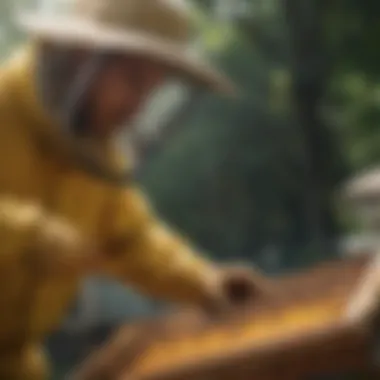

Farmers' Markets and Community Events
Farmers' markets and community events are often buzzing with local beekeepers eager to share their passion. These gatherings present an informal opportunity to chat with them and explore beekeeping through firsthand accounts and experiences.
You might encounter:
- Bee Demonstrations: Some events feature live demonstrations, allowing you to see the bees in action, learn about their behavior, and understand the equipment used by beekeepers.
- Honey Tastings: What better way to learn about beekeeping than tasting the fruits of the beekeeper's labor? Honey tastings can provide you a sensory experience that can deepen your appreciation for what these small creatures accomplish.
- Workshops and Classes: Many vendors at these markets often provide workshops or can guide you to local classes that help you get your feet wet in the practice of beekeeping.
Online Platforms for Workshops
In today's digital age, online platforms are a boon for aspiring beekeepers who might not have local resources. Websites like Reddit, Facebook groups, and specialized platforms often offer virtual workshops and guidance on beekeeping. Here’s why these platforms can be beneficial:
- Accessibility: Whether you live in the city or a rural area, accessing virtual workshops can help you learn at your own pace.
- Expert Talks: Many platforms host knowledgeable speakers from various aspects of beekeeping, providing a diverse set of insights that may not be available locally.
- Community Engagement: Even online, you can connect with an array of individuals who can answer your questions, assist with concerns, and provide feedback on your beekeeping journey.
Beekeeping experiences can really enrich your understanding of farming and ecology. Whether you’re connecting with local beekeepers through associations, engaging at farmers’ markets, or joining an online workshop, every step paves the way to a greater appreciation of bees and their essential role in our ecosystems.
Preparing for Your Beekeeping Experience
Stepping into the world of beekeeping isn’t just about approaching a hive and hoping for the best. Proper preparation can mean the difference between a rewarding experience and a disaster filled with stings and confusion. Understanding what's involved in preparing for a day with bees can enhance both enjoyment and learning. By equipping yourself with the right gear and knowledge, you cultivate an environment that fosters both safety and discovery.
Essential Gear and Equipment
Before you even think about opening a hive, it's essential to gather the right equipment. While some might assume that beekeeping is all about bees and honey, effective beekeeping hinges on the appropriate tools, each serving a unique function. Here’s a rundown of must-have items:
- Bee Suit: A full-body suit will act as your first line of defense. Make sure it fits comfortably to minimize constriction. This will help keep you sting-free and lets you focus on the task at hand.
- Gloves: A pair of good-quality gloves is vital. They not only protect your hands from stings but also let you work more confidently around bees. Depending on your preference, you might choose leather for durability or latex for dexterity.
- Bee Smoker: This tool is used to calm bees, making them less aggressive. The smoke masks alarm pheromones and provides a bit of a buffer, allowing you to work without disturbing them too much.
- Hive Tool: It is a multifaceted instrument that helps with everything from prying open hive boxes to scraping excess wax. It’s a must-have for any beekeeper.
- Bee Brush: You might also consider a soft bee brush to gently encourage bees to move off frame without harming them. This is particularly useful during honey harvesting or hive inspections.
Once you have your gear sorted, it’s also wise to check for bee health supplies, such as sugar water or essential oils, depending on the practices of the beekeeper you'll be working with.
Understanding Safety Protocols
Diving into the world of bees can be exhilarating, but it’s just as crucial to recognize the potential risks involved. Proper safety protocols not only keep you safe but also ensure that the bees remain unharmed and productive. Here are some safety considerations:
- Communication is Key: Always listen to the experienced beekeepers guiding you through the day. A friendly reminder here and there can include basic commands like "don’t swat" or "keep calm."
- Assess Allergies: Before starting, it’s essential to know if you or anyone else has allergies to bee stings. Carrying an EpiPen can save a life in emergencies.
- Be Mindful of the Area: Always be aware of your surroundings when working with the bees. Watch for people and pets nearby, and ensure you have ample space to move without bumping into anything.
- Follow Hive Protocol: Each hive may have its own set of rules, especially when it comes to inspecting. Make sure you’re clear on what’s expected before you dive in.
"Preparation is the key to a fruitful day in the hive; be organized, vigilant, and mindful of both your well-being and that of the bees."
When you're well-prepared, there's a greater chance that your day in the hive will deepen your appreciation for these remarkable creatures and the work involved in beekeeping. It allows you to focus not just on avoiding stings but also on learning and fostering a respect for the delicate balance of nature.
Activities During Your Beekeeping Day
Spending a day as a beekeeper is more than just a pleasant outing; it's an intimate dive into the world of these industrious insects. Each activity you engage in provides essential insights into understanding bees, their behaviors, and the crucial eco-system functions they perform. These choices not only enrich your knowledge but also create a lasting impression of how interconnected our lives are with these small creatures.
Hive Inspection Techniques
Inspecting a hive is like peeking into a bustling miniature city where each bee plays a vital role. The first step in this process often involves donning a beekeeper's suit and gloves, protecting yourself from potential stings while maintaining ease of movement. Remember to approach the hive calmly and confidently; bees can sense fear and agitation. A gentle demeanor goes a long way in reassuring them.
During the inspection, look for the queen bee’s activities. Spotting her can be quite fulfilling, as she is the heart of the hive. A good practice is to use a smoker to calm the bees. The smoke masks pheromones released by the bees to signal alarm, allowing you a peaceful, thorough inspection.
When checking the frames, pay attention to:
- The presence of capped brood, indicating healthy egg-laying
- Honey stores, vital for winter survival
- Signs of diseases or parasites such as Varroa mites
"A healthy hive speaks volumes about its care; neglect leads to disease."
These inspections not only serve functional purposes but also help form a bond between the beekeeper and the hive, letting you marvel at the bees' complex social structure.
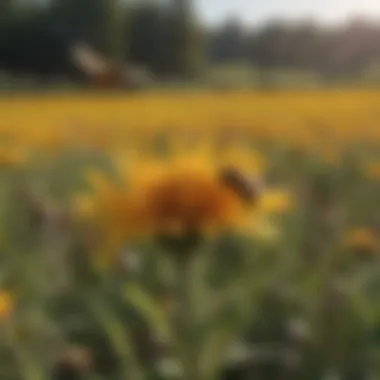

Harvesting Honey
Harvesting honey is the spectacle that many anticipate when considering an active day of beekeeping. But it’s essential to approach this task with respect. Warm months are ideal for honey extraction; ensure that most bees are foraging outside the hive to minimize disturbance during this task.
Begin by using a honey extractor, which relies on centrifugal force to extract honey from the frames. Adherence to sanitary practices is crucial to avoid contamination:
- Ensure all tools are clean and ready
- Use a honey strainer to filter out any impurities
- Store the honey in sterile jars, labeled for freshness
The sweet rewards of this hard work are not just in the jars of honey filled with floral notes and textures, but in the satisfaction that your effort contributes to the survival of these important pollinators.
Caring for Bees
Caring for bees might often feel like nurturing a delicate ecosystem rather than just maintaining a hive. This involves consistent evaluations of the bees' health and behavior.
Feeding bees is an important part of long-term care, especially during periods of dearth. In late autumn or early spring, you may have to supplement their diet with sugar syrup or fondant. Check for any signs of weakening, including reduced activity or absent brood, which indicates immediate intervention may be necessary.
Additionally, be aware of the seasonal fluctuations that affect hive dynamics. Each stage, from swarm preparation in late spring to winter storage, requires different levels of attention and care. Preventive treatments for pests need to be part of your routine to keep the hive healthy and thriving.
Committing time to understand these various aspects of beekeeping makes you not just a caretaker but a true steward of the environment. Your efforts grow beyond personal fulfillment, allowing you to contribute to a broader ecological balance.
Understanding the Role of Bees in Ecosystems
Bees are not just buzzing around for the fun of it; their role in ecosystems is nothing short of vital. These insects engage in pollination, which is a cornerstone of biological diversity. When we examine the interconnectedness of species in nature, it becomes clear that bees are essential players in maintaining a balanced and healthy ecosystem. Without them, many plants wouldn't be able to reproduce, which would lead to a cascading effect on both flora and fauna.
Pollination, in simple terms, is the transfer of pollen from one flower to another, resulting in fertilization and subsequent seed production. This process supports the growth of not only wild flora but also numerous crops that humans rely on for food. It's a bit like a production line where each bee plays its part, ensuring that the whole system operates smoothly. Let’s dig deeper into the specifics.
Pollination and Biodiversity
The significance of pollination extends beyond agricultural concerns; it's at the heart of biodiversity. Bees facilitate the reproduction of approximately 75% of the world’s flowering plants. Consider this: without bees, we might lose a variety of wildflowers that play a crucial role in supporting wildlife, which includes birds, mammals, and other insects.
Think of pollinators as nature's mighty architects. They help maintain a diverse range of plant species, which in turn supports a plethora of animal life. Some examples of their impact include:
- Fruit Trees: Such as apples, cherries, and mosaic, which depend heavily on bee activity for fruit production.
- Vegetables: Like tomatoes and cucumbers also require pollination assistance from bees to maximize yields.
- Wild Plants: Many wild plants depend on specific bees for pollination, such as clover and alfalfa, vital for local wildlife.
Protecting bee populations means preserving our natural heritage and supporting the intricate networks of life that contribute to the health of our planet.
Impact on Agriculture
The role of bees in agriculture is hard to dismiss. These hardworking insects are responsible for pollinating about one-third of the crops we consume. This includes berries, nuts, and vegetables that we often find on our tables. A stark reality is unfolding in agriculture today; the decline in bee populations directly threatens food security and farmers' livelihoods.
Here are some staggering insights into the impact of bees on agriculture:
- Increased Yield: Crops that are bee-pollinated often yield more than those that aren't. For example, studies show that honeybee-pollinated almonds see a better harvest compared to those left to wind pollination.
- Quality Matters: Bee-pollinated fruits and vegetable tend to be of higher quality—better size, taste, and shelf life. This affects everything from a farmer’s market reputation to their bottom line.
- Economic Boost: In the United States alone, bees contribute close to $15 billion annually to crop production. This figure captures the value not just of what’s grown, but of what sustains our economies, families, and communities.
"Bees might be small, but they carry big responsibilities when it comes to sustaining our food systems."
In summary, understanding the role bees play, both in natural ecosystems and agricultural settings, is vital for anyone interested in beekeeping. Their decline poses significant threats not only to plant biodiversity but also to food resources we often take for granted. By engaging in beekeeping, one directly contributes to understanding and aiding in the sustainability of these crucial species. Supporting local beekeepers can also have a ripple effect on fostering healthier ecosystems by nurturing bee populations.
In essence, bees are the quiet champions of our environment, and recognizing their importance is the first step towards making informed decisions about what we cultivate and how we engage with nature.
The Future of Beekeeping and Sustainability
As we move deeper into the 21st century, the quest for sustainable agricultural practices has never been more crucial. Beekeeping, while historically rooted in tradition, is now at a crossroads where innovation meets conservation. The future of beekeeping is intertwined with sustainability, addressing environmental challenges and supporting biodiversity. Understanding this relationship holds significant benefits for beekeepers and the ecosystem alike.
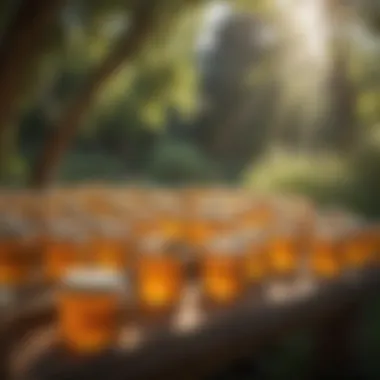

Challenges Facing Beekeepers
The struggles that beekeepers face today are often magnified by broader environmental issues. Some of the major challenges include:
- Colony Collapse Disorder: A phenomenon that has taken a toll on bee populations globally. Bees mysteriously abandon their hives, leading to significant losses for beekeepers.
- Pesticide Use: Chemicals used in agriculture can be detrimental to bee health. The collision course between effective crop protection and pollinator safety is a pressing concern.
- Habitat Loss: Urbanization and extensive farming reduce the natural habitats bees rely on. This leads to less food availability.
"The health of our bees is a reflection of the health of our environments. If we neglect their plight, we risk the pivotal role they play in our food systems."
Addressing these challenges takes a grassroots effort. Many beekeepers are banding together, advocating for better policies and practices that would protect these essential creatures.
Innovative Beekeeping Practices
Amid these sails of adversity, beekeepers have not stayed idle. The industry is evolving with innovative practices aimed at enhancing sustainability. Here are a few noteworthy examples:
- Organic Beekeeping: Shifting from conventional practices to organic methods minimizes the impact on bee health, employing natural alternatives to manage pests and diseases.
- Urban Beekeeping: As cities expand, beekeepers are making their mark in urban environments. Rooftops and community gardens are turning into makeshift hives, thus bringing bees closer to local food systems and increasing public awareness.
- Data-Driven Beekeeping: Embracing technology allows beekeepers to monitor hive health and track bee behavior more effectively. Sensors and apps can provide real-time data, giving insights into factors that affect the hive's status.
By implementing these strategies, beekeepers not only contribute to their health but also foster greater environmental practices that support our fragile ecosystems. As we look ahead, the collaboration between innovative practices and sustainability will be paramount in preserving what we know about these tiny yet formidable pollinators.
Choosing Local Beekeepers to Support
Supporting local beekeepers is more than just a nice thing to do – it’s about fostering a vibrant ecosystem that’s essential for agriculture and the environment. Choosing local beekeepers allows you to connect with your community while also ensuring that your honey is fresh and sustainably produced. There’s something to be said about knowing where your food comes from, especially when it involves such a crucial component of our ecosystem.
By going local, you also help keep the agriculture economy buzzing. Small-scale beekeepers often use far more sustainable practices than larger operations. This supports healthy bee populations and encourages biodiversity in the regions where these bees live and operate.
"Each local beekeeper you support helps ensure the survival of these remarkable pollinators and the food systems they are an integral part of."
When you buy their products directly, it creates a relationship built on trust and transparency. You can ask questions about their methods, pay attention to how they care for their hives, and understand the impact of their work. Those factors are a deep part of the decision-making process when it comes to choosing a local beekeeper.
Criteria for Selecting Beekeepers
When it comes to selecting a local beekeeper to support, several criteria can help guide your choice. While personal taste may play a role in your decision, there are several foundational aspects to consider:
- Sustainability Practices: Look for beekeepers who prioritize environmental sustainability. That includes practices such as organic farming, minimizing chemical pesticide use, and engaging in ethical beekeeping methods.
- Transparency: A good beekeeper should be open about their processes. Seek out those willing to share their techniques and answer any questions you might have about their operations.
- Quality of Products: Try different products from various local beekeepers and take note of their respective qualities. This could be honey, beeswax, propolis, or even pollen. Freshness should be a hallmark of whatever they’re offering.
- Community Engagement: Support beekeepers who are involved in their local community, whether through educational programs or local farmers' markets. An active beekeeper is more likely to be engaged in maintaining healthy bee populations while also sharing the importance of their work with others.
- Recommendations and Reviews: Word of mouth matters. Ask around and see if any friends or family have recommendations. Checking online reviews can also give you an idea of a beekeeper’s reputation.
Ethical Considerations
Choosing the local beekeeper to support is also an ethical matter. It’s important to consider how their practices impact not only the bees but the broader environment. Here are a few points to think about:
- Humane Treatment of Bees: Ethical beekeeping extends beyond just the honey produced; it’s also about how beekeepers treat their bees. Look for beekeepers who avoid practices like culling entire colonies or using harsh chemical treatments.
- Integrating Beekeeping into the Ecosystem: Local beekeepers who respect their surroundings often practice pollinator-friendly methods, maintain native plants, and contribute to habitat preservation.
- Education and Outreach: Beekeepers who actively engage in educating the community about the importance of bees and biodiversity typically embody a more ethical approach. This could include workshops, talks, and hands-on experiences for the public.
By considering these elements, supporting a local beekeeper becomes an informed decision that aligns with both personal values and dedication to ecological sustainability. It’s about creating a chain reaction of trust and responsibility that ultimately leads to a healthier planet.
The End: The Value of Experiencing Beekeeping
Experiencing beekeeping is more than just a hobby; it is an enlightening journey that straddles personal discovery and environmental stewardship. Engaging with bees serves as a bridge connecting individuals to nature and our food systems. This direct interaction with hive life not only fosters an appreciation for these pollinators but also unveils a world that many find mesmerizing yet often overlooked.
Personal Growth Through Beekeeping
Walking into a hive can be an eye-opener. The intricate social structure of bees—worker bees, drones, and the queen—mirrors human society in fascinating ways. You begin to understand leadership, teamwork, and the balance of roles within a community. As you learn to handle bees, confidence grows—not just in the beekeeping skills you acquire but in yourself. Challenges arise, such as smoke issues or rogue bees, but each hurdle becomes a lesson.
- Skill Development: Handling equipment, understanding bee behavior, and learning hive maintenance can sharpen your problem-solving and practical skills.
- Mindfulness: The steady rhythm of hive life demands patience and attention. This mindfulness can reduce stress and enhance your overall well-being.
- Community Engagement: Beekeeping often leads to connections with local beekeeping clubs, fostering a sense of belonging and shared purpose.
Contributing to Environmental Awareness
The plight of bees has become a clarion call for change. By immersing yourself in beekeeping, you become a part of a larger dialogue about sustainability and environmental responsibility. Supporting local beekeepers aids in combating factors threatening bee populations, like pesticides and habitat loss. You’re not just a spectator; you're part of the solution.
"Every bee you save contributes to the ecosystem and food production in our communities."
- Pollination Advocates: Bees are critical to pollinating many crops. Understanding their role can empower individuals to advocate for bee-friendly practices in their areas.
- Sustainable Practices: The experience teaches the merits of organic farming and biodiversity, nudging individuals toward eco-conscious decisions in their day-to-day lives.
- Educational Outreach: As a beekeeper, you can share knowledge about bees, inspiring others to appreciate and protect these essential creatures.
Experiencing beekeeping is a multidimensional opportunity. It nurtures personal development while contributing to collective environmental awareness. This dual benefit elevates the experience, making it profoundly impactful for both the individual and the ecosystem.



